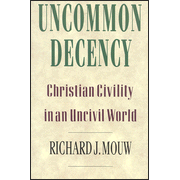Book Notes
 Richard Mouw, Uncommon Decency; Christian Civility in an Uncivil World (Downers Grove: InterVarsity Press, 1992), 173pp.
Richard Mouw, Uncommon Decency; Christian Civility in an Uncivil World (Downers Grove: InterVarsity Press, 1992), 173pp.
Richard Mouw, president of Fuller Seminary in Pasadena, wrote this short and simple book a dozen years ago, but it is, perhaps, even more timely today than when it first appeared. The last several presidential elections indicate that our country and our churches are badly divided over a broad range of important issues like gay rights, abortion, stem cell research, the place of America in the world, global economics, health care, and the list goes on. Many people employ a military metaphor to describe our so-called "culture wars." President Bush divided our world in terms of an "axis of evil." In a war, to state the obvious, you have friends and foes, enemies and allies, the goal being for Good (that would be "our" side) to defeat Evil ("their" side). Sharp, partisan and demonizing rhetoric about these issues divides us even further. One is left to exasperate with Rodney King, who lamented after police who had publicly beaten him were acquitted and riots erupted, "why can't we all just get along?"
Mouw shows how and why Christians should not only be people of conviction, but people of compassion and civility. We are, he reminds us, to "pursue peace with everyone" (Hebrews 12:14), and to "show every courtesy to everyone" (Titus 3:2). Civility does not mean we have to like everyone we meet, forfeit our convictions to a relativistic perspective, or befriend people as a manipulative ploy to evangelize them. Rather, it means caring deeply about our civitas and its public life, because God so cares. After defining the nature and parameters of Christian civility, Mouw investigates its implications for our speech, attitudes, pluralistic society, sexual mores, other religions, and leadership in a fallen world. He explores the limits of civility, when there is no "on the other hand." His chapter on hell asks whether we can believe in hell and still be civil. In his final two chapters he cautions against out tendencies to triumphalism, and trying to usher in the kingdom of God right now, as opposed to appreciating the ways and means of a patient, slow-moving God who loves His creation deeply and longs to redeem it.


